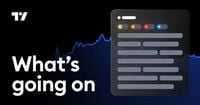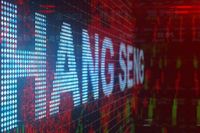The Hang Seng Index faced a tumultuous week, marked by significant volatility and a historic drop, as escalating trade tensions between the United States and China sent shockwaves through global markets. On April 8, 2025, the index plunged by more than 13%, marking its steepest one-day decline since the 1997 Asian financial crisis. This downturn followed President Trump's unexpected announcement of severe tariffs, which China quickly countered with retaliatory measures.
After reaching a peak of $24,855 on March 19, the Hang Seng Index has seen a staggering decrease of about 20%, falling to a low of H$20,000—the lowest level since February 3, 2025. This drastic decline has placed the index into a technical bear market, raising concerns among investors about the future of the Hong Kong economy.
Despite this recent downturn, analysts are cautiously optimistic about a potential rebound. The Hang Seng Index has outperformed other global markets, remaining positive for 2025, even as it grapples with the challenges posed by the ongoing trade war. The index's resilience can be attributed to the fact that many of its largest constituents, such as Tencent and ICBC, primarily generate revenue within China, minimizing their exposure to U.S. tariffs.
Investor sentiment around the Hang Seng Index has been heavily influenced by tariff-related news. A recent report by Bloomberg suggested that President Trump might consider a 90-day pause on tariffs (excluding China), which sparked optimism among traders. If such a pause were to materialize, it could serve as a catalyst for a broader recovery in global markets.
As the Hang Seng Index opened significantly lower on April 9, 2025, down 632 points (3.14%), settling at 19,494 points, the National Index and Technology Index also faced declines. The National Index dropped by 232 points (3.13%), while the Technology Index fell by 194 points (4.26%). Major companies within the Hang Seng Index experienced substantial losses, with Alibaba Group down 5% and Tencent Holdings declining by 3.3%.
In light of the economic pressures, the Chinese government has indicated that it has tools at its disposal to mitigate the impact of U.S. tariffs. Following Trump's announcement of a 50% tariff on all Chinese goods, Beijing responded by implementing a reciprocal 34% tariff on U.S. products. Furthermore, Chinese officials have vowed to defend their business interests vigorously, stating that they would "fight to the end" against external pressures.
Market analysts have noted that the Hang Seng Index remains above key technical indicators, including the 200-day moving average, suggesting that it could rebound in the coming weeks. The Relative Strength Index (RSI) has also indicated that the index is in oversold territory, further supporting the possibility of a rebound.
In the broader context, the U.S. stock markets have also experienced significant volatility, with the Dow Jones Industrial Average initially surging by over 1,400 points on April 8, only to close down by 320 points. This marked the fourth consecutive day of decline, as fears surrounding the trade war escalated, driving the VIX index—a measure of market volatility—up by 11% to 52.33.
Asian markets followed suit on April 9, with the Japanese stock market opening down by more than 1,100 points. In the commodity markets, West Texas Intermediate crude oil fell by 4%, reflecting the bearish sentiment gripping financial markets globally. Concurrently, the U.S. dollar declined against major currencies, with the U.S. Dollar Index sliding by 0.47%.
As traders assess the impact of these developments, many are keeping a close eye on the economic data set to be released later this week, including China's Consumer Price Index (CPI) and Producer Price Index (PPI). In February, the CPI fell by 0.7% year-over-year, while the PPI dropped for the 29th consecutive month.
In response to the recent market turmoil, the Chinese financial regulator has announced plans to raise the equity asset cap for some insurers by approximately 5%, aiming to channel more long-term capital into the stock market and support the economy. This move is expected to bolster investor confidence and potentially stabilize the Hang Seng Index.
As the situation continues to unfold, market participants remain cautious yet hopeful about the prospects for recovery. The Hang Seng Index's performance over the coming weeks will be closely monitored, particularly as traders look for signs of stabilization in the face of ongoing geopolitical tensions.
In summary, while the Hang Seng Index has faced significant challenges due to the escalating trade war, its underlying strength and potential for recovery remain a focal point for investors. The index's performance will be critical in determining the direction of the Hong Kong market and could serve as a bellwether for broader global economic trends in the coming months.








